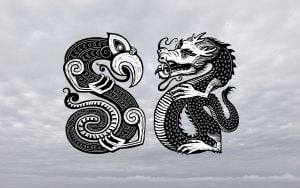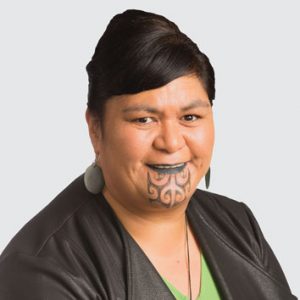Understanding the China–NZ relationship: The Dragon and the Taniwha
 By Danping Wang, Senior Lecturer of Chinese, the University of Auckland
By Danping Wang, Senior Lecturer of Chinese, the University of Auckland
For many Chinese people watching international news in April 2021, what New Zealand’s Foreign Minister Nanaia Mahuta said about New Zealand’s new approach to China was unexpected. But for the members of the Five Eyes group*, especially Australia, it was clearly a betrayal.
That morning, Mahuta delivered her first speech on the New Zealand–China relationship since her appointment as foreign minister in 2020. Mahuta is the first woman to hold New Zealand’s foreign ministership, and she is also an Indigenous Māori leader. Mahuta wears traditional Māori lip and chin markings, known as a moko kauae, that visually declare her alignment with Māori customs and traditions.
In her speech, Mahuta used two symbolic creatures—the Dragon from Chinese and the Taniwha from Māori mythologies—as a metaphor to outline what she thinks New Zealand’s relationship with China should look like.
Mahuta: “I see the Taniwha and the Dragon as symbols of the strength of our particular customs, traditions and values, which aren’t always the same but need to be maintained and respected.” She continued: “I liken it to the respect a Taniwha would have for a Dragon and vice versa.”
Respect underpins any healthy relationship between peoples, but it appears to have gone missing from political discourse when Western countries’ current policies towards China are considered.
In recent years, Chinese people like me have become accustomed to provocative rhetoric in the English language news media—so the last thing we expected was a ‘Five Eyes’ country suddenly calling to centralise respect in their policy towards China.
Mahuta’s speech that morning told a different story, and a more engaging one, that showed her deeper consideration of China’s aims and desires. Her speech affirmed that “New Zealand is respectful, predictable and consistent in the way we seek to engage in the pursuit of our long-standing and deeply held values and interests.”
The perspective that Mahuta brought to New Zealand’s relationship with China embodies a typically Indigenous approach to dealing with partners and solving problems. The foundation of Māori epistemology and ways of knowing and being rest on relationships between people (Sadler, 2007). In other words, we exist only in relation to others, and respect is the first step towards a good relationship.
Another point Mahuta made in her speech resonates strongly with Chinese philosophy. She said,
“They [the Dragon and the Taniwha] have many forms, are symbols of leadership, prestige and strength, and are to be revered.” She also said, “At times, we will act in association with others that share our views and sometimes we will act alone. In each case, we will make our decisions independently, informed by our values and our own assessment of New Zealand’s interests.”
The Chinese version of Mahuta’s point relates to what Confucius said about making friends: 君子和而不同 (Jūnzǐ hé ér bùtóng). In English, this can be translated as: “Good people should strive for harmony but not conformity.”
Mahuta’s speech affirmed that New Zealand has its own independent foreign policy towards China and will not prioritise conformity [with the Five Eyes group]. After her speech, Mahuta told the media that New Zealand feels “uncomfortable with expanding the remit of Five Eyes”. She suggested that Five Eyes allies should focus solely on intelligence sharing, implying that New Zealand is not interested in following its Five Eyes partners and playing geopolitical tic-tac-toe with China.
But can New Zealand really have an independent voice when it comes to China?

NZ Foreign Minister, Hon Nanaia Mahuta
Mahuta’s debut China-policy speech has reverberated around the globe. News commentators have made it very clear that there is no middle ground for New Zealand. Australia criticised New Zealand’s stance as being too soft on China. In fact, New Zealand had already been criticised for not signing up to Five Eyes statements condemning China over issues involving Hong Kong, the Uighur people and for not being as assertively critical as Australia over the origins of COVID-19.
Since 2017 Australia has frequently been commended by other western nations for taking a critical stance and standing up to China, despite the significant cost to the Australia–China trading relationship. New Zealand’s Prime Minister Jacinda Ardern was recently savaged during debate in British parliament as being “in a hell of an ethical mess” because her government did not follow suit in declaring China’s treatment of the Uighur people to be genocide. Instead, New Zealand has chosen less provocative language to discuss human rights abuses.
Since Mahuta’s speech, New Zealand has become more deeply entangled in the complex relationship between Australia and China. Jacinda Ardern has clarified on numerous occasions that New Zealand does not intend to break ranks with its Five Eyes allies.
This will not be an easy path for New Zealand. On the positive side, New Zealand’s three Confucius Institutes have remained intact despite the anti-China sentiments of the past decade, while Confucius Institutes in many Western countries have been labelled “spy agencies” and closed down. New Zealand and China signed a Free Trade Agreement (FTA) in 2008 and upgraded it in 2021. As part of the FTA, New Zealand’s Confucius Institutes have provided more than 800 Mandarin language assistants to hundreds of New Zealand schools over the past 10 years (Wang, in press). Many Kiwi kids had their first chance to meet and study with young Chinese students through those programs.
Next year, 2022, will witness the 50th anniversary of diplomatic relations between New Zealand and China. It will also be 180 years since the first communities of Chinese people arrived in New Zealand as settlers to contribute to its multicultural society. It is time to think about a future where the Dragon and the Taniwha might even work together as guardians of the world’s peace.
*The Five Eyes group is an intelligence-sharing alliance; its members are Australia, Canada, New Zealand, the UK and the US.
** The featured image on this post is by Adam Errington Ngāti Raukawa. **
References:
ABC (2021). New Zealand ‘uncomfortable with expanding the remit’ of Five Eyes, says Foreign Minister. Retrieved from https://www.abc.net.au/news/2021-04-19/new-zealand-five-eyes-intelligence-sharing-china-australia/100078834
Guardian (2021). New Zealand draws back from calling Chinese abuses of Uyghurs genocide. Retrieved from https://www.theguardian.com/world/2021/may/04/new-zealand-draws-back-from-calling-chinese-abuses-of-uyghurs-genocide
New Zealand Government. (2021). He Taniwha He Tipua, He Tipua He Taniwha: The Dragon and the Taniwha. Retrieved from https://www.beehive.govt.nz/speech/%E2%80%9Che-taniwha-he-tipua-he-tipua-he-taniwha-dragon-and-taniwha%E2%80%9D
Sadler, H. (2007). Mātauranga Māori (Māori Epistemology). International Journal of the humanities, 4(10), 33-45.
Wang, D. (in press). Seventy years of Chinese language education in New Zealand: A transdisciplinary overview. In Y. Zhang & X. Gao (Eds.), Frontiers in the teaching and learning of Chinese as a second language. Routledge.